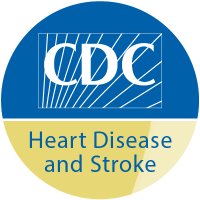
CDC Division for Heart Disease & Stroke Prevention
@CDCHeart_Stroke
Providing public health leadership to improve cardiovascular and brain health for all. Privacy policy: https://t.co/ujySf2kZAZ
ID:979053452583227392
http://www.cdc.gov/dhdsp 28-03-2018 17:51:47
2,3K Tweets
6,2K Followers
208 Following

May is National Stroke Awareness Month. Women are at a higher risk of dying from a stroke than men. Protect yourself by learning about stroke risk, treatment, and prevention for women here. #StrokeMonth bit.ly/3U0qZ0M


A stroke can happen to anyone. In fact, strokes affect some 800,000 people in the U.S. each year. Watch this video from Mayo Clinic to learn the basics of stroke, including risk factors, treatment, and recovery: bit.ly/3VgNlMm

Changes to your arteries as you age may increase your risk of high blood pressure. Stay proactive about your heart health by having your #BloodPressure checked regularly. Learn more with this The National Institute on Aging (NIA) resource: bit.ly/3PgTHHH









Improve your heart health by committing to moving more each day! Check out this video from @NIH_NHLBI to learn new ways to be active. #MoveWithHeart bit.ly/3UxmdIO


Are you making every bite count? Balancing nutrition can reduce your risk of heart disease. Take this #MyPlate quiz from Dept. of Agriculture to find out how you can balance your plate and improve your #HeartHealth . #NationalNutritionMonth bit.ly/3OvyPfy

